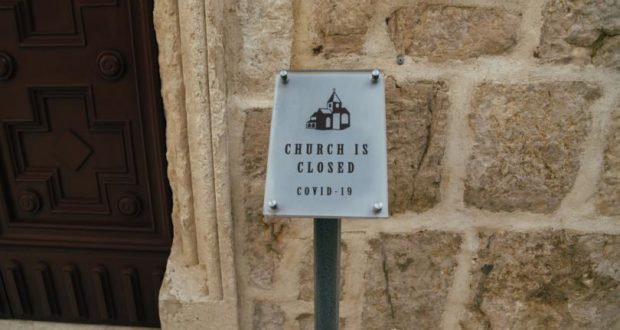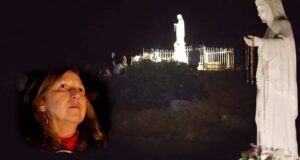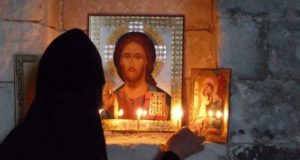حكومات وثنية تضرب بالحائط الحقوق المدنية ومواد الدستور..
بقلم مايكل هاينز – إعتبر الكاهن الأيرلندي الكاثوليكي بي جيه هيوز (P.J. Hughes) حصول خطأ فادح، “بالإبتعاد عن الهنا يسوع المسيح، بسبب أقوال القادة الحكوميين”.
وكان الكاهن الأيرلندي “هيوز” واجه مرة أخرى الشرطة. بتغريمه 500 يورو لعدم إبعاد الناس عن القداس أثناء إغلاق COVID-19 الحالي.
وجريمته رفضه إبعاد المؤمنين الذين حضروا إلى الكنيسة لحضور القداس ، كونه يرفض إغلاق أبواب الكنيسة.
وكانت الحكومة الأيرلندية إتخذّت تدابير حظر العبادة العامة بحجة انتشار عدوى COVID-19. نتيجة لذلك ، أوقفت القداديس عام منذ 26 كانون الأول/ديسمبر 2020، فلا يُسمح بفتح الكنائس إلا للصلاة الخاصة، وتشييع الجنازات بحضور “10 أشخاص، وفي حفلات الزفاف يقتصر العدد على 6 أشخاص. وبالتالي لا يُسمح بممارسة العبادة إلا بعد عودة البلاد إلى “المستوى الثاني”، والتي قد تستغرق شهورًا.
وكشفت مصادر مقربة من الكاهن الأيرلندي أنه سيرفض دفع الغرامة، وأنه مستعد لمواجهة السجن إذا لزم الأمر.
في رسالته الإخبارية لرعيته في نهاية هذا الأسبوع، كرّر الكاهن الأيرلندي الكاثوليكي هيوز التزامه بالأسرار المقدسة. كاتبًا: “أنا لا أقبل الرسالة السلبية من قادتنا الذين يطلبون منا الابتعاد عن يسوع”.
وأضاف هيوز: “على الرغم من حجم الكنيسة والمكان المقدس بسبب وجود يسوع في الخيمة المقدسة.. غالبية الناس يتمتعون بصحة جيدة ويستطيعون الذهاب للتسوق وإحضار أطفالهم إلى المدرسة ويعمل الكثير منهم في بيئات مغلقة. نحن نرتكب خطأ فادحًا برفضنا ربنا وإلهنا يسوع المسيح بالابتعاد لأن المسؤولين الحكوميين يقولون إنه يجب علينا ذلك “.
“أنا لا أقبل ولن أقبل هذا الطلب من قبل أناس لا يدركون الخطأ الذي يرتكبونه. من حقنا الدستوري الاحتجاج ما دام سلميًا. من حقنا الدستوري ممارسة عقيدتنا والتجمع للصلاة معًا”.
وأوضح الكاهن الإرلندي موقفه ضد القيود المفروضة على العبادة: “بالنسبة لأولئك الذين يخشون الإصابة بالفيروس في الكنيسة ، يمكنهم أن يختاروا بحرية البقاء في المنزل وأن يعيشوا حياتهم كما يعتقدون أنه من الأفضل القيام بذلك. لقد تم الإبلاغ عني مرة أخرى وصدرت غرامة لأنني احتفل بالقداس مع الحضور “.
ويحمي الدستور الأيرلندي نفسه حق العبادة في المادة 44: “تعترف الدولة بأن تكريم العبادة العامة يعود إلى الله القدير. يجب أن يحترم اسمه ويحترم الدين ويكرمه. حرية الوجدان وحرية اعتناق وممارسة الشعائر الدينية ، خاضعة للنظام العام والأخلاق ، مكفولة لكل مواطن “.
وينص كذلك على: “لا يجوز للدولة أن تفرض أي إعاقات أو تمارس أي تمييز على أساس المهنة أو المعتقد أو الوضع الديني“.
وتأتي هذه الغرامة الأخيرة كآخر حلقة في سلسلة من الإجراءات القاسية المتزايدة التي اتُخذت ضد الكاهن مرة أخرى في نوفمبر 2020 ، تم تهديده بالملاحقة القضائية من قبل الشرطة لرفضه إبعاد الناس عند وصولهم إلى الكنيسة لحضور القداس. واقترب 4 ضباط من اكاهن “هيوز” بعد قداس الأحد، محذرينه من أنه قد “يتم محاكمته لخرقه قواعد Covid التي تم تقديمها أثناء فترة الإغلاق الأخيرة “.
وكشف الأب “هيوز” في رسالته الأخيرة: “سأمارس حقي الدستوري على الرغم من شكوى الناس، على الرغم من أنني لا أطع الأسقف عندما أعارض نصيحته. لا يمكننا فقط رفض يسوع في القربان المقدس “.
على الرغم من فرض الدولة والكنيسة إغلاق الكنائس ، ذكر أحد أساتذة القانون أنه في ظل القيود الحالية ، فإن العبادة الدينية ليست محظورة في الواقع…
المصدر: lifesitenews.com
Irish priest fined for offering Mass during lockdown, not turning people away
By Michael Haynes – ‘We are committing a grave mistake by rejecting our Lord and God Jesus Christ by staying away because government officials say we must,’ the priest said.
Irish Catholic priest Father P.J. Hughes has once again been confronted by police. Hughes was fined €500 fine for not turning people away from Mass during the current COVID-19 lockdown.
Fr. Hughes, of Mullahoran parish in Co. Cavan, was reportedly approached by Gardai (Irish police) and presented with a €500 fine. His perceived offense was refusing to turn away members of his congregation who turned up in the church for Mass, since he refuses to lock the church doors.
Under the current lockdown, the Irish government has taken measures to prohibit public worship under the pretense of preventing the spread of COVID-19 infections. As a result, there have been no public Masses since December 26, 2020, communal worship is forbidden, and places of worship are only allowed to open for private prayer. Funerals are currently allowed to occur, but with just “10 mourners.” Weddings are similarly limited to 6 people. Worship will only be permitted once the country goes back down to “level 2” in its restrictions, which could be months away.
The Irish Catholic stated that sources close to Hughes had confirmed that he would refuse to pay the fine, and was ready to face jail if necessary.
LifeSiteNews contacted the Gardai for confirmation and comment, but was told that it was not their policy to comment on named persons in particular cases.
In his parish newsletter this weekend, Fr. Hughes addressed the issue, re-iterating his commitment to administering the sacraments. “I do not accept the negative message of our leaders who are telling us to stay away from Jesus,” he wrote.
“Despite the size of the church and the holy place that it is because of the presence of Jesus in the Holy Tabernacle, the church has been deemed a hot spot for the spread of the virus by the gardai,” said Hughes. “The majority of people are healthy and able to go shopping, bring their children to school and many of them are working in enclosed environments. We are committing a grave mistake by rejecting our Lord and God Jesus Christ by staying away because government officials say we must.”
“I do not accept and will not accept this demand by people who do not realize the wrong they are doing. It is our constitutional right to protest so long as it is peaceful; it is our constitutional right to practice our faith and assemble to pray together.”
He explained his stance against the restrictions on worship: “For those who are afraid of catching the virus in the church then they can have the free choice to stay at home and live their lives as they think it best to do. I have been reported again and the gardai have issued a fine because I celebrated Mass with people present.”
The Irish Constitution itself actually protects the right to worship in Article 44: “The State acknowledges that the homage of public worship is due to Almighty God. It shall hold His Name in reverence, and shall respect and honour religion. Freedom of conscience and the free profession and practice of religion are, subject to public order and morality, guaranteed to every citizen.”
It further states: “The State shall not impose any disabilities or make any discrimination on the ground of religious profession, belief or status.”
This recent fine comes as the latest in a series of increasingly heavy-handed measures taken by the Gardai against Fr. Hughes. Back in November 2020, he was threatened with prosecution by the police for his refusal to turn people away when they arrived into church for Mass. Four officers approached Hughes after Sunday Mass, warning that he might be “prosecuted for breaching the Covid rules introduced during the last lockdown period.” Following that, he was warned that he had “one more chance” to adhere to the restrictions.
Hughes revealed that “somebody reported me,” which led to his discovery by the civil authorities. He was then rebuked by his ordinary, Bishop Francis Duffy of the Diocese of Ardagh and Clonmacnoise, who reportedly told Fr. Hughes that he was in “dangerous territory.” Despite this, Hughes remains committed to offering the sacraments to people, as he demonstrated in his recent newsletter: “I will exercise my constitutional right even though people are complaining, even though I am not obeying the bishop when I go against his advice. We can’t just reject Jesus in the Holy Eucharist.”
Notwithstanding the state and the Church enforcing closure of churches, one law professor has stated that under the current restrictions, religious worship is not in fact prohibited. Professor Oran Doyle of Trinity College Dublin explained that while “relevant events” are forbidden, “[i]t is beyond argument that ‘relevant event’ does not include events held for religious reasons; religious events are therefore not prohibited by Regulation 8.”
“Rather than clearly distinguish between what citizens are required to do and what they are requested or advised to do, Government statements frequently encourage people to believe that their legal obligations are more restrictive than is in fact the case,” Doyle wrote.
In fact, referring to Hughes’s encounter with the police in November, and media reports that Hughes was warned about future prosecution, should he be found saying Mass again, Doyle said that “this statement of the legal position was categorically incorrect.
 Agoraleaks Agoraleaks
Agoraleaks Agoraleaks







